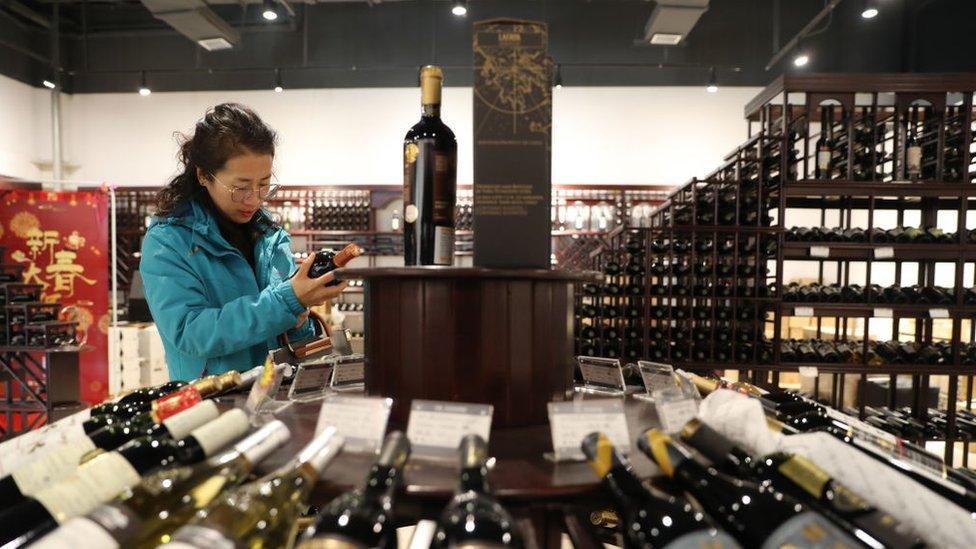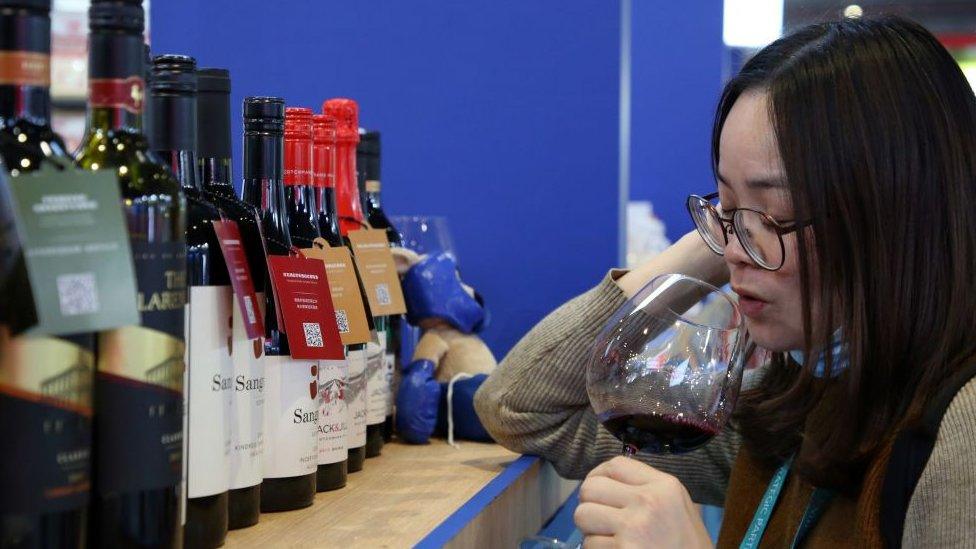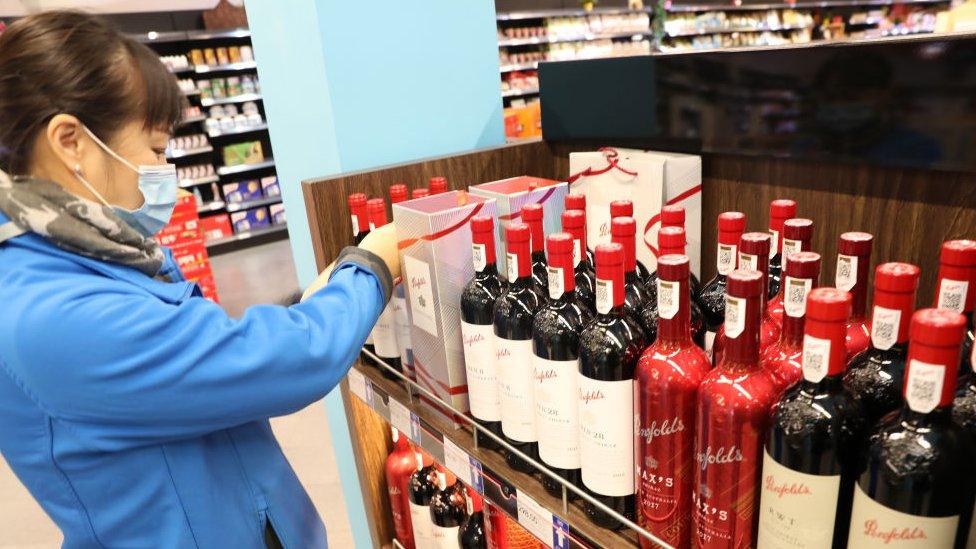China's drinkers develop taste for home-grown wines
- Published

Emma Gao says that Chinese wine has greatly improved in quality in recent years
Emma Gao says that "when people taste our wine they're happy".
Ms Gao runs the Silver Heights winery and vineyards in China's Ningxia province, about 1,000 km (620 miles) west of Beijing.
They sit in the foothills of the Helan Mountains, where it's dry and sunny with mild temperatures in summer and plenty of irrigation from the Yellow River.
Still, the winters are so bitterly cold that the vines need to be buried under 30cm (12in) of soil late in the year so that they make it through to the next season.
Wines from the region have grown in popularity in China, and business is good for Silver Heights. A medium-sized winery, it produces up to 200,000 bottles a year and exports to 15 countries, in addition to its home market.

Chinese wine drinkers are more willing to try a domestic label
In fact, Chinese wine is having a moment, domestically. While foreign wine is often regarded as more prestigious, under this year's lockdowns Chinese drinkers have increasingly sought out home-grown wines.
Why has this been the case? And will Chinese wine maintain its increased popularity in its home market after the Covid-19 pandemic ends, or will drinkers switch back to imports?
According to industry analysts Wine Intelligence, there has been a shift to buying more domestic bottles in most wine-producing countries this year.
Nowhere has this been more pronounced than in China, where 54% of respondents to a Wine Intelligence survey in August said they were now buying more Chinese wine compared to pre-pandemic levels.
"There is a dramatic rise in the consumption of local wine this year," says sommelier and wine educator Roger Chow, from Xiamen in Fujian province.

Silver Heights Winery is located 1,000km west of Beijing
One possible reason, he thinks, is that people switched because imported wine simply became trickier to find due to the pandemic.
Wine import volumes into China slumped 32% in the first half of 2020 compared to the previous year, according to industry figures. Imports by value also declined sharply over the same period, down 31% to $752m (£565m).
But according to Janet Wang, author of The Chinese Wine Renaissance, it's unlikely to account for the entire change, because most stores and distributors would have had months worth of existing imported stock.
Instead, she thinks the shift is about Chinese producers being savvy enough to sense an opportunity.
"Anecdotally, you do hear people saying 'we're seeing a lot more promotions around Chinese wine, or a lot of distributors are taking up Chinese wine, or inquiring about Chinese wine'," says Ms Wang.
For many years, expats in China turned up their nose at the local wines, and as recently as five years ago one Chinese executive even candidly admitted his company's wines were "not very good", external.

Chinese wine connoisseurs have previously focused more on imported bottles
It's not unusual for a young wine industry to endure some sniping from better established rivals overseas. Even Australian wines - which now account for around A$3bn ($2.2bn; £1.6bn) in exports a year - were famously derided as "Chateau chunder" by British comedy troupe Monty Python.
Some Chinese winemakers have sought to get around this reputational issue by partnering with European wineries and in some cases making their labels look similar to European brands.
But according to Daxue Consultants - a market research group which (among other things) helps Chinese winemakers with their branding and marketing - some wineries now want to play up their connection to China.
"When we look at the label, some can be very westernised in style. The other side is quite interesting. They're more like localising or integrating Chinese elements," says Daxue's Yuwan Hu.
Ms Wang says that in recent years the general quality of Chinese wine has greatly improved. And in fact, the best Chinese wines have been winning competitions for even longer.
She also points out that some Chinese winemakers have been trying to cater to the national palate, which comes from the county's well-established food culture.
"So straight away, some of the more astute producers were saying 'this is quite a sophisticated market in terms of the palate'," she says.
Russ and Phillipa have a vineyard on the Isle of Wight
Ms Gao, who learned winemaking in France's Bordeaux region, agrees that if there's a shift towards Chinese wine, it is because of higher standards, and producers who know their market.
"I believe the quality of Chinese wine keeps improving," she says. "And this has been matched by a new generation of wine lovers that are more adventurous, proud of their Chinese heritage."
Ben Luker from Wine Intelligence, says that the pandemic has also been a catalyst for Chinese consumers to trust domestic products more.
"Trust in domestic produced wine, and even trust in imported wine, has always been something that's very much a challenge to the industry, because there was always that fear that it was counterfeit," he says.


New Economy is a new series exploring how businesses, trade, economies and working life are changing fast.

Figures from Wine Intelligence show that 49% of Chinese respondents had more confidence in domestic wine than they did before the pandemic.
But will the rising sales of Chinese wine in its home market continue into 2021 and beyond?
Mr Chow thinks Chinese winemakers have finally cut through after years working hard to improve the quality, and by successfully marketing their products to customers.
"They are [also] trying to lower their sales price, even though their costs are quite high right now," he says.
At the very least, Chinese winemakers might have an advantage in their home market against Australian winemakers.
At the end of November, the government introduced tariffs of up to 212% on Australian wine as part of a wider trade dispute between the countries. Beijing accused Australia of dumping wine in China at under cost price due to subsidies.
Still, that doesn't apply to all imports. Ms Hu points out that free trade deals have made Chilean wines in particular are very competitive on price.

Australian wines like these have been hit by big import tariffs in China
Ms Wang thinks that even with foreign competition Chinese wine will only further increase in popularity in its home market, as consumers realise that local wines are good value for money.
"I think that's definitely going to be the long-term trend, that more people are going to discover that Chinese wines are good quality, and good value," she says. "Chinese consumers are very pragmatic. They choose really on quality, taste and value."